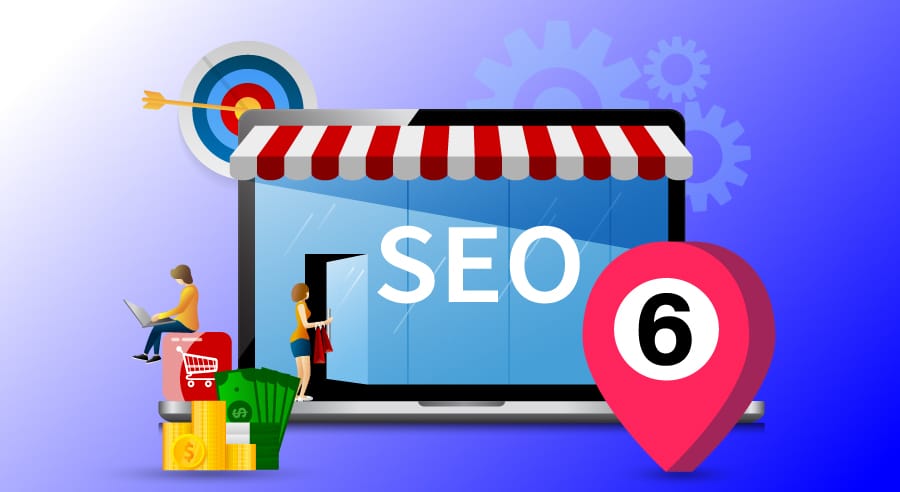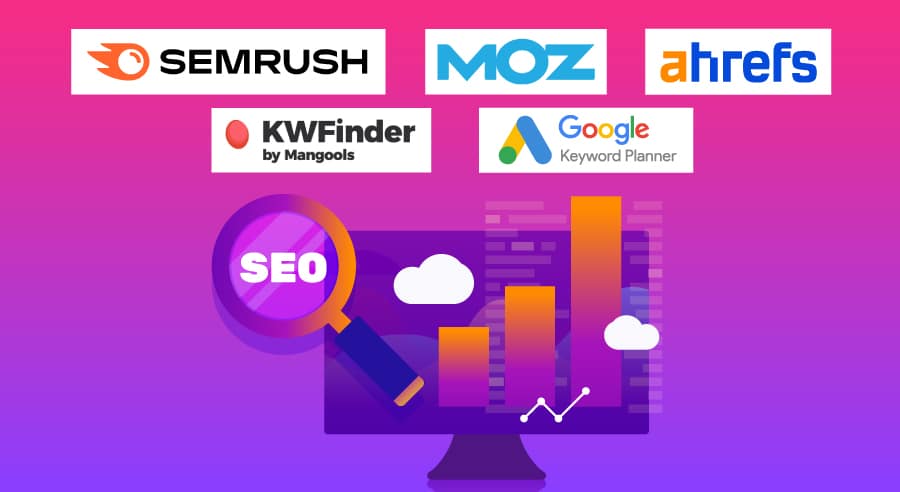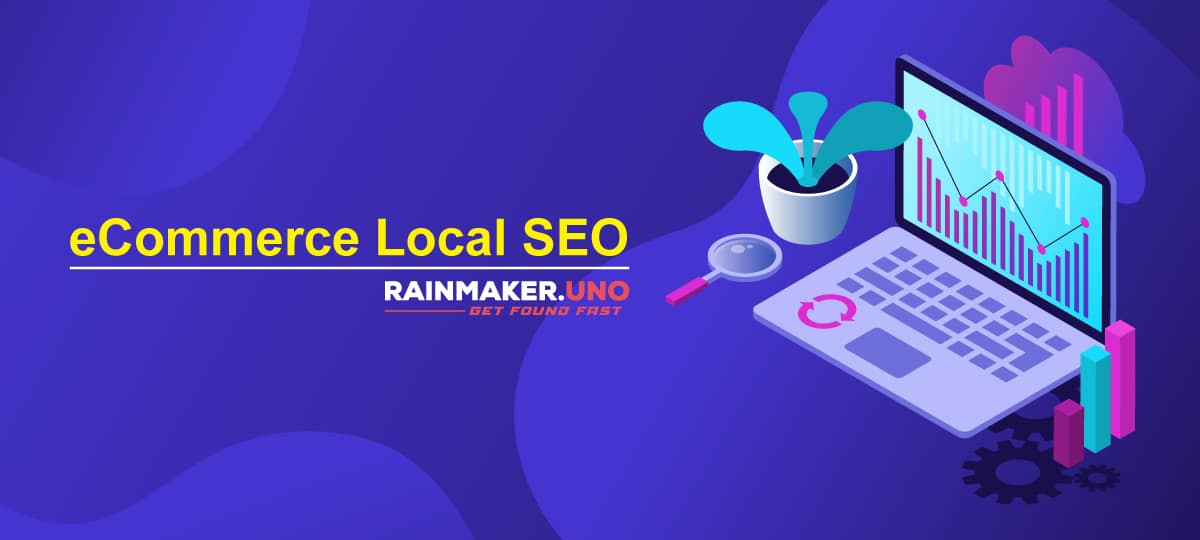Most eCommerce businesses underestimate the power of local SEO, and that’s one of the crucial areas to leverage for generating more business.
Local SEO is essential for improving your ranking in local search results and is extremely important for promoting physical stores.
Targeting a local audience is crucial, as it increases footfall and maximizes conversions of local customers who can easily reach out to your physical location.
While local SEO has several benefits, it is also important to know how to incorporate it properly.
This guide will provide expert insight into local eCommerce SEO, including its benefits and practical strategies for growing your business.
Top 6 Local SEO Strategies

Here are some effective local SEO tactics to optimize your eCommerce store for local target audience search queries.
1. Set-Up A “Google My Business” Page
Google My Business (GMB) profile is an amazing tool that offers an extensive directory that includes your company’s details, such as address, phone number, and working hours.
A GMB profile is usually the first thing people see when they search for your company online. It provides valuable information to prospective customers and significantly improves your search engine optimization—and the best part is that it’s free!
Once you’ve set up your account, follow the given steps to optimize your GMB page:
- Encourage Reviews: Ask satisfied customers to review your business on the GMB page to increase credibility with future customers.
- Update Contact Information: Provide your business contact information through several channels, such as email and phone numbers, and check that everything is correct and updated.
- Craft a Descriptive Overview: Write an effective business description that will introduce new customers.
- Add Photos and Videos: Upload high-resolution images and videos of your products and use them to highlight special offers.
Regularly Update: Include high-resolution pictures and videos of the products, and use these media to emphasize special offers. Keep track of your My Business page and update fresh information frequently.
2. Use Relevant Keywords
Keywords are important for any SEO strategy, but if you’re not careful, you might target the wrong keywords.
Usually, businesses pick popular and generic keywords but won’t attract local traffic.
So what’s the solution?
You can use advanced tools, such as Semrush and KWFinder, to carry out detailed and comprehensive keyword research for your targeted audience.
Once your keywords are ready, use them on your promising site, including blogs and other long-form content. When inserting keywords, don’t stuff your content with too many because this is a form of spamming, and your website or page will suffer in ranking.
3. Create Location-Specific Content
Once you’ve identified the most appropriate keywords for your business niche, use them to create location-specific content.
Doing so boosts your website’s visibility by creating engaging blog posts, informative videos, detailed articles, and comprehensive guides tailored to these locations.
This targeted approach broadens your business’s online presence and helps generate more leads, amplifying your reach and impact.
4. Add Customer Reviews
Since 93% of customers look up reviews before purchasing, positive reviews are essential for any online store.
Positive reviews can increase your rank on search engine results pages, as Google prioritizes business with customer reviews.
Collecting reviews can be difficult because shoppers frequently need encouragement to share positive feedback.
Here’s how to ask your customers to give feedback:
- After a customer makes a purchase, send them a follow-up email asking for a review.
- Ask your customers to leave reviews on your social media accounts.
- Include a QR code with your product that takes customers to your review page.
5. Add High-Quality Backlinks
According to Google, when a reputable source links to your website, it endorses your business, making high-quality backlinks crucial for local SEO.
Instead of getting links from generic or unauthorized websites, aim for secure backlinks from authoritative sites. This targeted approach enhances your SEO and supports your credibility and relevance in your niche.
Here’s how you can generate links to your website:
- Participate in local events.
- Get featured in city or county directories.
- Sponsor a local charity.
- Earn a feature in a local newspaper or magazine.
- Use Google to find authoritative websites in your area.
- Offer value when reaching out to influencers or businesses, such as writing a city guide or a blog post for their audience.
6. Optimize Your Website For Mobile Phones
A responsive and mobile-friendly website is crucial as mobile devices (smartphone and tablet users) are the primary traffic source for local business websites.
Here’s how to create a mobile-friendly website:
- Optimize Images And Videos: Compress videos and photos to speed up load times without compromising quality. For mobile devices, use formats such as WebP for quicker download times.
- Font and Button Sizes: Avoid small text or buttons that are too close together. Instead, select readable fonts and ensure buttons and links are the right size for easy tapping.
- Quick Loading: To improve the mobile browsing experience, reduce the HTTP (Hypertext Transfer Protocol) requests made, use browser cache, and optimize server response times.
Testing Across Devices: To find and address any usability problems unique to mobile users, test your website frequently across various browsers and devices.
Top 5 Popular Local SEO Tools

Here are the best local SEO tools to help you reach customers in your area, whether you operate a storefront or provide services to a specific region.
1. Semrush
With its extensive database and comprehensive analytics, Semrush provides practical insights into tailoring content around high-potential keywords and increasing organic traffic.
It also offers in-depth SEO audits to find and address website problems, tracks keyword rankings, and analyzes backlinks for strategic link-building.
Semrush blends an easy-to-use interface with AI-driven data to optimize your whole search engine optimization campaign.
2. Ahrefs
Ahrefs offers detailed backlink analysis. Its Keyword Explorer provides comprehensive data on search volumes, CPC, and keyword difficulty, allowing you to target successful keywords.
Its Site Audit tool helps you find technical problems and provides workable solutions to improve user experience and SEO. Ahrefs is a crucial tool for thorough SEO since it helps with keyword ranking tracking and content ideation.
3. Moz Pro
Moz Pro is a comprehensive SEO toolkit that provides valuable insights to improve your store’s online visibility.
By providing helpful information like search volume and competitor analysis, keyword research tools assist you in locating potential targets. To improve rankings, the site audit feature finds technical and on-page problems and suggests fixes.
Link analysis and rank tracking allow you to manage backlinks and monitor positions. Moz’s measurements for Page and Domain Authority also let you benchmark against rivals, making it a crucial tool for managing intricate SEO campaigns.
4. KWFinder
KWFinder offers essential parameters, including search volume, cost-per-click, and competition levels, and finds less competitive keywords. Focusing on these highly targeted, low-competition keywords will help you efficiently increase traffic.
Moreover, KWFinder groups keywords according to relevancy and lets you monitor ranks over time. It analyzes the best-performing content produced by competitors to help you create compelling content that gets social media shares and backlinks.
5. Google Keyword Planner
Google’s free Keyword Planner gives you important information directly from Google, enabling you to assess search volume and competition for important eCommerce keywords.
With this knowledge, you can better target highly interested keywords in your content and find long-tail variations with less competition but still attract particular searchers.
Keyword Planner also helps with seasonal and cyclical content planning by monitoring search trends. It provides useful initial keyword data and effortlessly connects with Google Ads for efficient campaign administration.
Conclusion
Local SEO for eCommerce is crucial in directing online traffic to physical stores by generating valuable leads.
Implementing local SEO strategies can take time, but they yield everlasting effects. Use the tactics mentioned in this blog and customize them according to your business type.
